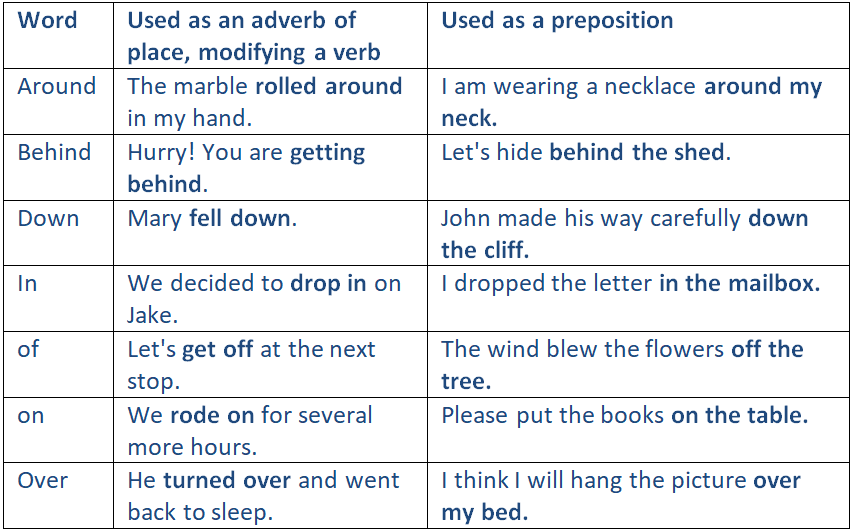

Grammar


Tenses


Present

Present Simple

Present Continuous

Present Perfect

Present Perfect Continuous


Past

Past Simple

Past Continuous

Past Perfect

Past Perfect Continuous


Future

Future Simple

Future Continuous

Future Perfect

Future Perfect Continuous


Parts Of Speech


Nouns

Countable and uncountable nouns

Verbal nouns

Singular and Plural nouns

Proper nouns

Nouns gender

Nouns definition

Concrete nouns

Abstract nouns

Common nouns

Collective nouns

Definition Of Nouns

Animate and Inanimate nouns

Nouns


Verbs

Stative and dynamic verbs

Finite and nonfinite verbs

To be verbs

Transitive and intransitive verbs

Auxiliary verbs

Modal verbs

Regular and irregular verbs

Action verbs

Verbs


Adverbs

Relative adverbs

Interrogative adverbs

Adverbs of time

Adverbs of place

Adverbs of reason

Adverbs of quantity

Adverbs of manner

Adverbs of frequency

Adverbs of affirmation

Adverbs


Adjectives

Quantitative adjective

Proper adjective

Possessive adjective

Numeral adjective

Interrogative adjective

Distributive adjective

Descriptive adjective

Demonstrative adjective


Pronouns

Subject pronoun

Relative pronoun

Reflexive pronoun

Reciprocal pronoun

Possessive pronoun

Personal pronoun

Interrogative pronoun

Indefinite pronoun

Emphatic pronoun

Distributive pronoun

Demonstrative pronoun

Pronouns


Pre Position


Preposition by function

Time preposition

Reason preposition

Possession preposition

Place preposition

Phrases preposition

Origin preposition

Measure preposition

Direction preposition

Contrast preposition

Agent preposition


Preposition by construction

Simple preposition

Phrase preposition

Double preposition

Compound preposition

prepositions


Conjunctions

Subordinating conjunction

Correlative conjunction

Coordinating conjunction

Conjunctive adverbs

conjunctions


Interjections

Express calling interjection

Phrases

Sentences


Grammar Rules

Passive and Active

Preference

Requests and offers

wishes

Be used to

Some and any

Could have done

Describing people

Giving advices

Possession

Comparative and superlative

Giving Reason

Making Suggestions

Apologizing

Forming questions

Since and for

Directions

Obligation

Adverbials

invitation

Articles

Imaginary condition

Zero conditional

First conditional

Second conditional

Third conditional

Reported speech

Demonstratives

Determiners


Linguistics

Phonetics

Phonology

Linguistics fields

Syntax

Morphology

Semantics

pragmatics

History

Writing

Grammar

Phonetics and Phonology

Semiotics


Reading Comprehension

Elementary

Intermediate

Advanced


Teaching Methods

Teaching Strategies

Assessment
Adverbs Of Place
المؤلف:
EF.COM
المصدر:
...
الجزء والصفحة:
...
10-5-2021
1089
Adverbs of place
Adverbs of place tell us where something happens. Adverbs of place are usually placed after the main verb or after the clause that they modify. Adverbs of place do not modify adjectives or other adverbs. Some examples of adverbs of place: here, everywhere, outside, away, around
Examples :
John looked around but he couldn't see the monkey.
I searched everywhere I could think of.
I'm going back to school.
Come in!
They built a house nearby.
She took the child outside.
Here and there
Here and there are common adverbs of place. They give a location relative to the speaker. With verbs of movement, here means "towards or with the speaker" and there means "away from, or not with the speaker".

Here and there are combined with prepositions to make many common adverbial phrases.
Examples
What are you doing up there?
Come over here and look at what I found!
The baby is hiding down there under the table.
I wonder how my driver's license got stuck under here.
Here and there are placed at the beginning of the sentence in exclamations or when emphasis is needed. They are followed by the verb if the subject is a noun or by a pronoun if the subject is a pronoun.
Examples
Here comes the bus!
There goes the bell!
There it is!
Here they are!
Adverbs of place that are also prepositions
Many adverbs of place can also be used as prepositions. When used as prepositions, they must be followed by a noun.

Adverbs of place ending in -where
Adverbs of place that end in -where express the idea of location without specifying a specific location or direction.
Examples
I would like to go somewhere warm for my vacation.
Is there anywhere I can find a perfect plate of spaghetti around here?
I have nowhere to go.
I keep running in to Sally everywhere!
Adverbs of place ending in -wards
Adverbs of place that end in -wards express movement in a particular direction.
Examples
Cats don't usually walk backwards.
The ship sailed westwards.
The balloon drifted upwards.
We will keep walking homewards until we arrive.
Be careful: Towards is a preposition, not an adverb, so it is always followed by a noun or a pronoun.
Examples
He walked towards the car.
She ran towards me.
Adverbs of place expressing both movement & location
Some adverbs of place express both movement & location at the same time.
Examples
The child went indoors.
He lived and worked abroad.
Water always flows downhill.
The wind pushed us sideways.
 الاكثر قراءة في Adverbs of place
الاكثر قراءة في Adverbs of place
 اخر الاخبار
اخر الاخبار
اخبار العتبة العباسية المقدسة

الآخبار الصحية















 قسم الشؤون الفكرية يصدر كتاباً يوثق تاريخ السدانة في العتبة العباسية المقدسة
قسم الشؤون الفكرية يصدر كتاباً يوثق تاريخ السدانة في العتبة العباسية المقدسة "المهمة".. إصدار قصصي يوثّق القصص الفائزة في مسابقة فتوى الدفاع المقدسة للقصة القصيرة
"المهمة".. إصدار قصصي يوثّق القصص الفائزة في مسابقة فتوى الدفاع المقدسة للقصة القصيرة (نوافذ).. إصدار أدبي يوثق القصص الفائزة في مسابقة الإمام العسكري (عليه السلام)
(نوافذ).. إصدار أدبي يوثق القصص الفائزة في مسابقة الإمام العسكري (عليه السلام)


















